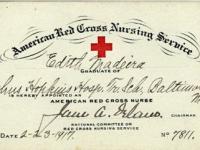Answer: The Red Cross Commission to Palestine.
Edith Madeira was born in 1865 in Philadelphia. In 1900 she obtained a nursing degree from John Hopkins Hospital Training School in Baltimore, Maryland. She served as a nurse superintendent for Howard Hospital in Philadelphia and Mountainside Hospital in Montclair, New Jersey. Madeira also served as a public health nurse and was superintendent of the Visiting Nurse Association in Harrisburg, Pennsylvania, and Waterbury, Connecticut. She died in 1951.
During World War I, Madeira committed herself to overseas relief efforts by volunteering for the American Red Cross Commission to Palestine. (The Middle East had been ravaged by the Russo-Turkish War of 1914-1918.) She was eventually named the commission's chief nurse, and she became responsible for overseeing all nursing staff. The commission consisted of ten nurses, six surgeons, three sanitary engineers, and twenty additional staff, including social workers and teachers. The commissions; operation in the Middle East commenced in Jerusalem on July 4, 1918. The commission provided health and social services to over fifty-four towns, villages, and refugee camps, extending from Port Said to the town of Acre on Palestine’s northern coast. It operated twelve hospitals and sixteen dispensaries in Palestine and surrounding areas.
After the war, the American Red Cross Commission to Palestine's work was assumed by a new committee, the America Committee for the Relief of the Near East. Madeira made the decision to not continue on with the new committee, and she returned to the United States in January 1919.
The papers of Edith Madeira at HSP (#2053) consist of typescript letters, 1917-1919; her “Report for Nursing Service” detailing the Commission’s work in Palestine; Madeira’s nursing diploma and license; memoirs detailing her voyage to Palestine, by way of South Africa and the Indian Ocean; memoirs featuring her service in Palestine and surrounding regions; and a scrapbook filled with photographs, memorabilia, and a few plant specimens.

